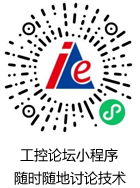STEP7网络组态的链接方式求教~ 点击:1181 | 回复:2
1、FDL是Profibus的一种协议,主要有如下特点:
主站或从站可以在任何时间点接入或断开FDL 将自动地重新组织令牌环
令牌环调度确保每个主站有足够的时间履行它的通信任务因此用户必须 计算全部目标令牌环时间(TTR)
总线访问协议有能力发现有故障的站失效的令牌重复的令牌传输错误和 其他所有可能的网络失败
所有信息(包括令牌信息)在传输过程中确保高度安全以免传输错误 海明距离HD = 4 .
2、FMS Connection
PROFIBUS FMS (Field bus Message Specification) has the following features:
For the transfer of structured data (FMS variables)
Fulfills the European standard EN 50170 Vol.2 PROFIBUS
For open communication with non-Siemens devices on PROFIBUS
Application on the remote communication partner acknowledges receipt of the data
Can be ordered in layer 7 of the ISO reference model
FMS services are provided on the PC as C functions
3、ISO Transport Connection
The ISO Transport connection has the following features:
Suitable for large quantities of data owing to "data blocking"
Allows communication to a partner (for example, SIMATIC S5 or PC) that supports sending and receiving of data in accordance with ISO Transport
You can use the Send/Receive utilities and the Fetchs and Write utilities to transmit data.
For Industrial Ethernet only
The receipt of data is confirmed by the ISO Transport service of the communication partner with an acknowledgement
ISO Transport (ISO 8073 class 4) corresponds to layer 4 of the ISO reference model
ISO Transport services are provided on the PC as C functions
4、ISO-on-CP Connection
The ISO-on-TCP connection has the following features:
Fulfills the TCP/IP (Transmission Control Protocol/Internet Protocol) standard with the extension RFC 1006 in accordance with layer 4 of the ISO reference model. RFC 1006 describes how the services of ISO layer 4 can be mapped onto TCP
Allows communication to a partner (for example, SIMATIC S5 or PC) that supports sending and receiving of data in accordance with ISO-on-TCP
You can use the Send/Receive utilities and the Fetchs and Write utilities to transmit data.
The receipt of data is confirmed with an acknowledgement
For Industrial Ethernet only
ISO-on-TCP services are provided on the PC as C functions
5、S7 Connections
S7 connections offer the following features:
Can be configured in all S7/M7 devices
Can be used in all types of subnet (MPI, PROFIBUS, Industrial Ethernet)
When using the SFBs BSEND/BRCV: secure transfer of data between SIMATIC S7/M7-400 stations; for example, exchanging data block contents (up to 64 Kbytes)
Using CPU 317-2 PN/DP as well as CPU 31x and a CP with the FBs BSEND/BRCV from the SIMATIC_NET_CP library or Standard Library also allows secure transmission of data to S7-300 and S7-400.
When using the SFBs USEND/URCV: fast, unsecured transfer of data independent of the time processing of the communication partner, for example, for event messages and messages.
Acknowledgement of data transfer from the communication partner via layer 7 of the ISO reference model
6、S7 Connections, Redundant
Properties as for S7 connections; however, restricted to S7 H CPUs as well as SIMATIC PC stations (such as OPC servers) and not on MPI subnets
Depending on the network topology, at least two connection paths between the connection end points are possible with a redundant S7 connection.
7、TCP Connection
The TCP connection has the following features:
Complies with the TCP/IP standard (Transmission Control Protocol/Internet Protocol)
Enables communication to a partner (such as a PC or non-Siemens device) that supports sending or receiving data according to TCP/IP.
You can transmit data by means of the utilities Send/Receive or Fetchs and Write.
For Industrial Ethernet only
As a rule, you can use the TCP/IP implementation in the operating system of the PC.
8、UDP Connection
The UDP (User Datagram Protocol) connection has the following features:
For Industrial Ethernet (TCP/IP protocol)
Allows unsecured transfer of contiguous blocks of data between two nodes
9、Point-to-Point Connection
The local CP 441 provides the link for the connection between an S7-400 CPU and a communication partner connected via a point-to-point connection. On the CP, a conversion is made to the addressing mechanisms of the selected transfer procedure. For this reason, the point-to-point connection ends in the CP 441 and not at the communication partner as for other connection types.
The number of connections to the CP depends on the set procedure.
10、E-Mail Connection
The e-mail connection has the following features:
For Industrial Ethernet (TCP/IP protocol)
Enables process data, for example, to be sent from data blocks via e-mail using an IT communications processor
Using the e-mail connection, you define the mail server via which all e-mails sent by an IT communications processor are delivered.
- 为什么放大电路会产生自激振...
 [8735]
[8735] - 给大家 培训下西门子的 CFC编...
 [8741]
[8741] - 松下PLC技术支持有问必答
 [13800]
[13800] - 关心PID调节者请近来!!!
 [15486]
[15486] - PLC控制系统设计的要点(转载...
 [12683]
[12683] - 三菱编程专门解码软件(本人花...
 [11883]
[11883] - 怎样用西门子S7 300 PLC的PI...
 [16186]
[16186] - 修工控网站发布修“活儿”任务...
 [7173]
[7173] - 一个点动开关控制一个电灯常...
 [14597]
[14597] - 三菱全系列编程软件SW8D5C-G...
 [9209]
[9209]

官方公众号

智造工程师
-

 客服
客服

-

 小程序
小程序

-

 公众号
公众号

















 工控网智造工程师好文精选
工控网智造工程师好文精选
